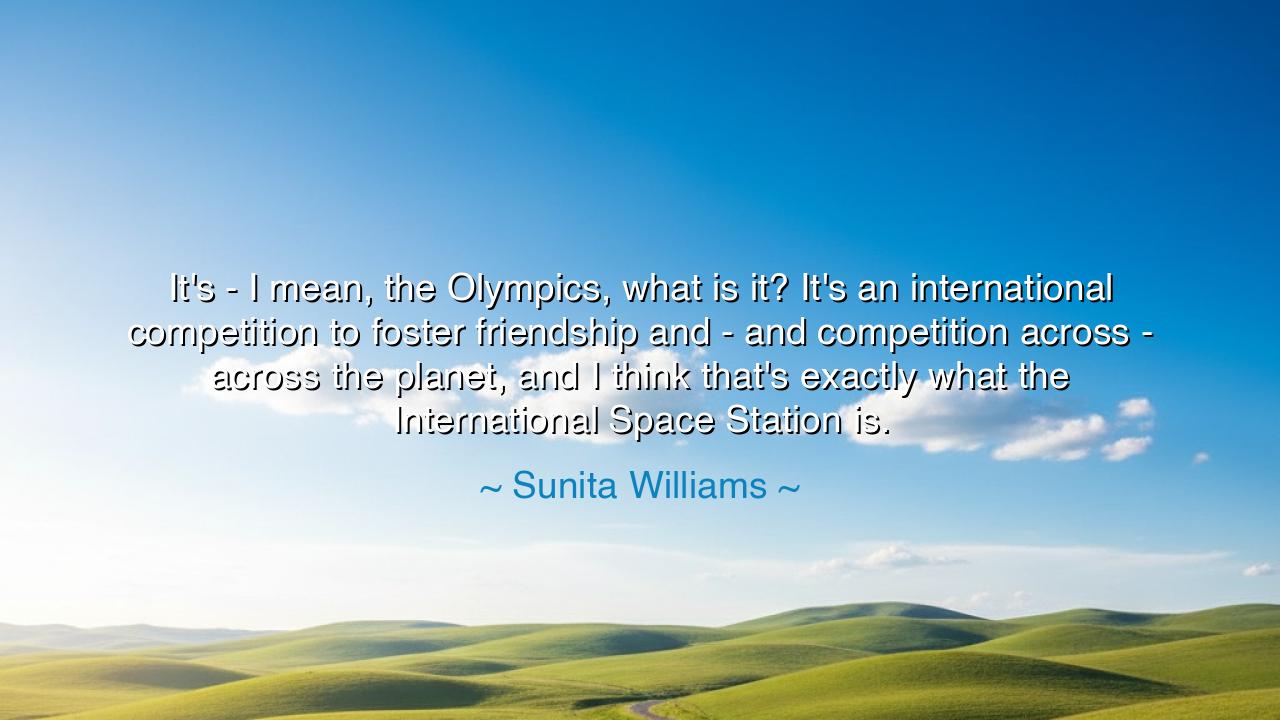
It's - I mean, the Olympics, what is it? It's an international
It's - I mean, the Olympics, what is it? It's an international competition to foster friendship and - and competition across - across the planet, and I think that's exactly what the International Space Station is.






“It’s – I mean, the Olympics, what is it? It’s an international competition to foster friendship and – and competition across – across the planet, and I think that’s exactly what the International Space Station is.” Thus spoke Sunita Williams, astronaut, explorer, and emissary between Earth and the heavens. In these words, she likens two of humanity’s greatest achievements—the Olympic Games and the International Space Station—as symbols of our shared striving, our boundless curiosity, and our capacity for friendship beyond borders. Her reflection is not merely about sport or science, but about the soul of civilization itself: that even amid rivalry, there can be unity, and even in the vast silence of space, there can be brotherhood.
Williams speaks from the vantage of one who has looked down upon Earth not as an Indian, not as an American, not as a representative of any single nation, but as a citizen of humanity. From the orbiting station she shared with men and women of different tongues and flags, she saw the world whole—no lines, no boundaries, no divisions. In that sight, she glimpsed what the ancients once dreamed of: a time when mankind might rise above the dust of war and pride to cooperate in the pursuit of knowledge. Her comparison of the Olympics and the Space Station springs from that vision. Both are arenas where human beings meet not as enemies, but as equals, testing themselves not against one another in hatred, but in excellence.
The origin of her thought lies in the very creation of the International Space Station itself. Built by nations that once stood on opposite sides of the Cold War—the United States and Russia—it became a living symbol of reconciliation. The same hands that once aimed missiles now extended them to assemble modules among the stars. Like the Olympic torch that passes from one nation to another, the ISS represents a continuity of hope, a reminder that competition need not destroy; it can inspire. It embodies the belief that progress, when shared, becomes more luminous—that the human spirit, when united, can transcend even the gravity that binds it.
Throughout history, moments of cooperation amidst rivalry have marked humanity’s most sacred triumphs. Consider the ancient Olympic Games of Greece, where warring city-states laid down their arms to compete in peace. For the span of the Games, battles ceased, and enemies shared bread and praise beneath the same sun. The Olympic Truce—that fragile covenant of respect—was proof that even those divided by politics and pride could meet under the banner of common purpose. So too does the International Space Station continue that ancient promise, though its arena is not in Olympia’s valley but among the constellations. There, instead of javelins, the tools are scientific instruments; instead of laurels, the reward is discovery.
Yet Williams does not speak of triumph alone; she speaks of process—of what must be nurtured continually if humanity is to endure. The friendship she praises is not sentimental—it is built through effort, understanding, and the shared trials of those who orbit a hostile void together. In the cold reaches of space, where each breath depends on another’s diligence, cooperation is not optional; it is sacred. When she calls it “exhilarating,” it is because she has lived it—because she has seen how trust between nations can replace suspicion, how collaboration can yield miracles that no single flag could achieve alone.
Her message extends beyond the stars. In a time when nations once again draw lines in the sand and hearts harden behind walls, Williams reminds us of our higher calling: to see one another as companions in the great voyage of existence. She invites us to view Earth as she did—one planet, fragile and blue, spinning in silence. The Olympics and the Space Station both show what is possible when humanity remembers its kinship. They are not merely institutions; they are prayers made real—testaments to the belief that striving together is nobler than conquering alone.
So let the listener take heed: whether you run a race or reach for the stars, do so with the spirit of friendship. Compete, but without cruelty; achieve, but not in arrogance. Cherish the diversity of nations as the painter cherishes color—each distinct, yet beautiful when combined. For the future will not belong to those who hoard, but to those who share; not to those who divide, but to those who unite.
And thus, Sunita Williams’s words endure as both remembrance and prophecy: that the truest measure of progress is not how high we climb, but how together we rise. The Olympics light the fire of unity on Earth; the International Space Station carries that flame into the heavens. Between them lies the story of mankind—fallible, hopeful, and forever reaching beyond itself toward the eternal stars.






AAdministratorAdministrator
Welcome, honored guests. Please leave a comment, we will respond soon